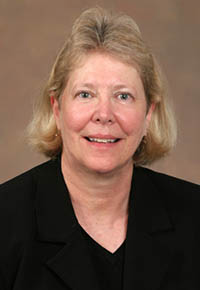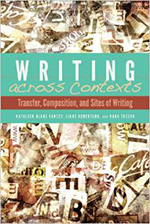 Professor Kathleen Yancey's recent publication Writing across Contexts: Transfer, Composition, and Sites of Writing (Utah State UP), which she co-authored with former Florida State rhetoric and composition doctoral students Liane Robertson and Kara Taczak, has been in circulation since only about the middle of 2014. The scope of the trio's research findings is already starting to expand, however, and the book recently won the 2015 CCCC Research Impact Award and a grant from the CCCC Research Initiative to fund further research.
Professor Kathleen Yancey's recent publication Writing across Contexts: Transfer, Composition, and Sites of Writing (Utah State UP), which she co-authored with former Florida State rhetoric and composition doctoral students Liane Robertson and Kara Taczak, has been in circulation since only about the middle of 2014. The scope of the trio's research findings is already starting to expand, however, and the book recently won the 2015 CCCC Research Impact Award and a grant from the CCCC Research Initiative to fund further research.
 Writing across Contexts relies on years of the authors' scholarship—individually and as a team—on composition subjects such as content in composition, transfer of writing, prior knowledge, and the practice of reflection, to name a few. The three of them used first-year composition courses at Florida State for the sites to test their theories about composition using a specific curriculum called Teaching for Transfer (TFT).
Writing across Contexts relies on years of the authors' scholarship—individually and as a team—on composition subjects such as content in composition, transfer of writing, prior knowledge, and the practice of reflection, to name a few. The three of them used first-year composition courses at Florida State for the sites to test their theories about composition using a specific curriculum called Teaching for Transfer (TFT).
"The research method itself is not particularly new, but the curriculum is new, and the idea that you would design a curriculum explicitly to support transfer writing and practice and that you would tell students that's why they are in your class—that this is an outcome of the class—that's new," Yancey says.
The book reports the results of the research, documenting how a class that is designed using the TFT curriculum compares to other kinds of composition classes in terms of preparing students for writing in other academic sites around the university.
"There was no question," Yancey says. "The TFT curriculum was not perfect, and we report where it worked and where it didn't. But it was far and away superior to other common models."
To win the CCCC award, Yancey says, there had to be clear evidence that the research has made an impact. The authors have presented their research at rhetoric and composition conferences, and they recently gave a presentation at the 2015 annual meeting of the Association of American Colleges and Universities. After the talk, Pat Hutchings, Senior Scholar at the National Institute for Learning Outcomes Assessment, approached the authors to ask for a scholarly contribution for her current effort to identify curricula and assignments that are especially valuable in supporting student learning.
In addition, several composition programs around the country are using the book as part of professional development for their teachers, Yancey says. A University of Connecticut student is also producing a replication study at that university, and the Illinois State University writing program is basing its entire curricula on the book. Arizona State University is using the book as part of its curricula redesign.
"The curriculum and the book are being taken up by a number of well-regarded programs; that's such a lovely compliment, and we're happy to do what we can to help," says Yancey, whose blog on the subject matter attracts visitors from around the world.
The origin of Writing across Contexts is based in research that Yancey has been doing for about the past 20 years. Her 1997 book Reflection in the Writing Classroom quoted Donald Schön on reflective transfer, for instances, and in 2007 she wrote a CCCC research grant to synthesize what was known about transfer of writing knowledge and practice.
She also has written several book chapters on the role the content of composition plays in student learning, and her 2004 address when she was CCCC chair also included the topic.
"The content that you have in any curriculum makes a big difference, and what it should be is the source of some contention within the field," Yancey says, adding that more focus has been given to the topic over the past decade or so. "From my point of view, it seemed like a long held and continuing interest, but from the vantage point of the field, I think it seemed very new."
When Taczak and Robertson came to FSU to earn their doctorates in rhetoric and composition, the three of them discussed all of these ideas, and further research helped Taczak and Robertson frame their PhD dissertations. Yancey had already decided to write a book, and she invited them to write it with her.
"Kara and Liane get a lot of credit because they were presenting on this topic for years at different conferences, and they were generating a lot of buzz," Yancey says. "They've been doing a lot of sharing with people in their presentations."
The curriculum laid out in Writing across Contexts has three pieces to it, Yancey says: (1) the content of the course, on composition and the key terms that the students work with—rhetorical situation, genre, and discourse community, for example; (2) a systematic practice of reflection, which is threaded throughout the course; and (3) students developing a theory of writing, articulated at the end of the class.
Their data sources included student interviews over a year-long period and writing projects the students produced both in first-year composition and then in courses from around the university—courses in biology, physics, chemistry, and film, for example. The instructors kept journals as well, in order to correlate where they put their teaching emphasis and what students took away from the courses.
"What we found was that the TFT courses did a much better job because the students had a process of reflection that enabled them to think about new writing assignments," Yancey says, "and they had a vocabulary that they could use to analyze them and figure out what they needed to do."
Readers of the book also responded favorably to the theorization of prior knowledge in the research process. Yancey says they saw three models in play with the TFT curriculum: assemblage, remix, and critical incidents.
"Whereas with more adept practitioners assemblage can create a coherent whole—as we see in Picasso's work—when it comes to students, that's not the way it works," she says. "They will come to first-year composition, they will learn something new, and then what they do, with all due respect to them, is they take one or two little bits of new information and they graft it onto the old model, such that it's not integrated." The key here, Yancey says, is that the students are not changing their previous writing habits.
Remix occurs when students take some of their prior knowledge—for example, from high school—acquire new information in a college composition course, and then create a more powerful and robust model of writing that allows them to frame new writing tasks. Remix is a more successful model, according to Yancey, although it is not an easy one to grasp.
"Imagine: you come to college after eighteen years, twelve of those spent writing, both in school and out, and you think you know a little something about writing," she says. "You walk into a writing class and encounter a whole new set of vocabulary and a completely different way of understanding writing. It's a bit like having cold water thrown in your face; it's a bit unnerving."
The third model is critical incidents, in which students examine what goes wrong in a certain situation and identify the issues that caused the misfire. Using any patterns found in the mistakes—both conceptual and practical—a person can change behaviors for the better.
"I'm not sure if the focus on error is what we need to do in writing," Yancey says. "But the critical incidents part—where something goes wrong, you try to figure out what it was, and you see it as an opportunity for learning—that absolutely works."
The central issue of prior knowledge, Yancey says, is "not whether and how students used prior knowledge; the central issue is whether this particular curriculum or a curriculum like it would in fact support students' transfer of writing knowledge and practice. The answer is yes."
The authors' research in this area did not stop with Writing across Contexts. Taczak, who now teaches at the University of Denver, a small and expensive private school, and Robertson, who teaches at William Paterson University, which attracts more working-class students, used the TFT curriculum they developed at FSU at their respective institutions, Yancey says. The findings at both institutions were basically the same.
The CCCC Research Initiative awarded its grant to Yancey; Robertson, Taczak, and Erin Workman, a current FSU rhetoric and composition PhD student; and Matt Davis, who earned his PhD in FSU's rhetoric and composition program and who now teaches at University of Massachusetts Boston. The entire group will work together in the next stage of research.
Workman's focus is on students who are visually mapping their prior knowledge and their new knowledge, to see if the theory about assemblage and remix shows up in students' maps and how those maps correlate with the quality of students' work. Robertson and Davis are examining how the TFT course might work in other settings, such as technical or professional writing. Taczak has already been collaborating with a colleague at Denver to determine if a hybrid model of a themed course would work with TFT curriculum. Yancey says that early results show that kind of course does not provide enough room for composition content.
Ideally, Yancey says, they would like to apply the TFT program to a writing across the curriculum program, something FSU lacks.
"If we did [have such a program], I think would it benefit all of us who teach and it certainly would benefit the students," she says. "Until we have such a thing, we have this kind of research and we can do other kinds of good work."
